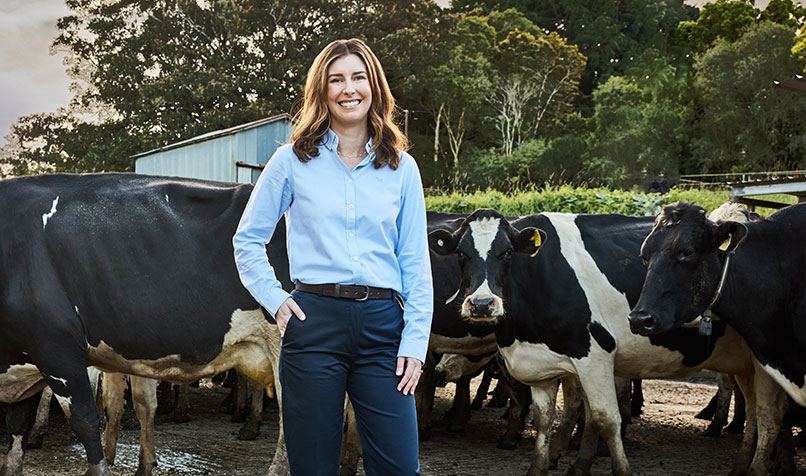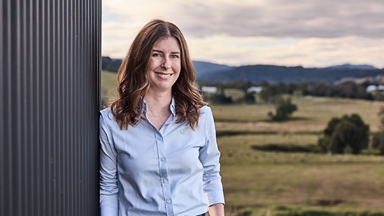Loading component...
At a glance
- Laura Wedmaier FCPA is CFO of Norco Co-operative, a 100 per cent farmer-owned dairy co-op in Australia.
- Taking the leap from the corporate to non-profit space was a “big game changer” for Wedmaier.
- She manages a team of over 30 staff located in the Gold Coast and Lismore. Norco’s annual revenue is over A$750 million.
My role: Careful balance
This is my second CFO role, and the size and scope of it is much larger than my prior senior executive experience.
Norco operates two business units. The first is dairy foods, a fast-moving consumer goods business processing milk and ice cream.
The second encompasses agricultural retailing, milling and commodities trading. The pace, challenges and capital needs of the two units are very different. Both need to be balanced carefully to ensure the right decisions are being made to propel the organisation forward in a sustainable way.
We have over 800 staff and five production facilities based in regional and rural locations. There are over 190 member farms that supply milk from northern New South Wales (NSW) and Queensland to our rural stores from as far north as Bundaberg all the way down to the Hunter region of NSW.
I manage over 30 people in Norco’s IT and finance teams, who are equally distributed across our two main corporate locations on the Gold Coast and in Lismore. The team works in each business unit and across the group.
I’m lucky to have a large number of team members who have worked at Norco for almost their entire careers, but I have also brought in new staff who offer fresh perspectives.
Because we’re a co-operative, we exist for our member farmers. Our staff are passionate about our brand and the fact that they are working for the last remaining 100 per cent farmer-owned dairy co-op in Australia.
Every day is different. Working in such a diverse, unique and growing business is about staying one step ahead. Number crunching is the easiest part. What really matters is what’s behind the numbers, telling that story so the business has a clear and honest understanding of performance.
Building and creating trust between the CEO, board and team is crucial.. If the trust isn’t there, it is hard to deliver on anything else. It’s always easy for the CFO to say “No”. I need to say, “Yes, but here’s the risk,” to bring perspectives around dimensions that others in the business might not always see.
Game changers: Change management
Taking a leap out of the corporate world into the non-profit space for about five years was a big game changer for me.
In 2016, after a successful career in multinational, fast-moving consumer goods companies and earlier in management and technology consulting, I decided to seek opportunities in non-profit and smaller organisations to diversify my experience and work somewhere with strong community and purpose.
I worked in a senior executive position leading finance, IT, operations, marketing, HR and governance in a top private girls’ school in Brisbane, and later in its sister school in the eastern suburbs of Sydney.
In multinationals, you can sometimes take good process and governance for granted because it’s already there when you arrive. Until you’re at the top, the changes you make and the influence you have can feel quite incremental and siloed to your own patch of expertise.
"We are looking at opportunities to support farmers at the ground level. We offer a cow financing program, and we have a whole range of programs to encourage our farmers to stay in the dairy industry."
One of the schools I worked in was having challenges with funding, which wasn’t understood until I arrived. It was quite a shock when I announced the need to refinance immediately and reduce costs.
Given the size of the turnaround required, I needed to move fast.
However, the organisation wasn’t ready for the changes. I needed to phase in the plan and convey it to the rest of the executives as well. Compliance with work, health and safety, as well as bank covenants and controls, couldn’t wait. So anything relating to that, or solely in my team’s remit, had to be dealt with at speed.
We renegotiated significant external contracts to remove overhead costs without impacting teaching or student wellbeing services and delivery.
For me, it was a huge lesson in change management. Even when something is critical, you need to align absolutely everyone in the organisation and choose what to do first. By the end of my four years there, the school was ready to embark on a major capital investment program.
Climate change and business: Forecast for the next decade
My challenges: From natural disasters to AI

In the past five years, Norco has undergone significant change. The co-operative has delivered more profit in that period than the prior 20 years cumulatively. This has occurred even while dealing with the devastating Lismore flood in 2022. We had to rebuild our ice-cream factory — with support from government — and it’s only been back in operation for 18 months.
The flood is still very fresh in the memories of Norco staff and our farmers, many of whom had to rebuild their homes. Flood mitigation is something that’s very high on our risk register, but the dairy industry itself has other difficulties.
The milk pool is declining in Queensland and northern NSW. A lot of farmers are exiting the dairy industry. That means that we have to access more milk from Victoria where there is a larger pool.
We are looking at opportunities to support farmers at ground level. We offer a cow financing program, and we have a whole range of programs to encourage our farmers to stay in the dairy industry. It is incredibly hard work being a dairy farmer. They get up at 4am in the morning, milking in the morning and the afternoon, 365 days a year.
To continue supporting our farmers, and to enable the co-operative to sustain its growth trajectory, we need to do things differently than we have in recent years. My role is critical to help Norco look to the horizon. From June to August 2025, Norco is sending me to California for the Stanford Executive Program, because the company understands that the CFO role goes beyond just numbers.
The other major challenge is the evolution of artificial intelligence (AI). The transformational aspect of AI is being talked about extensively. At Norco, we’re beginning its implementation as a forecasting tool, but the real challenges relate to cost and culture.
The CFO matters on the AI journey because we’re the only function that touches every part of the business and asks the uncomfortable questions. AI is a strategic investment with measurable value, but it needs to be supported with data governance, risk and control, and it has to have people and culture planning wrapped around it in order to ensure success.
Lessons learned
- Rise above: When things get emotional, political or chaotic, the CFO has to stay calm and grounded.
- Multidimensional decision-making: When numbers come naturally, it is easy to get fixated on them, but be sure to take multiple perspectives on big decisions from staff, customers and shareholders.
- Build and maintain trust: Make trust between the CEO, board, executives and your team a priority.

